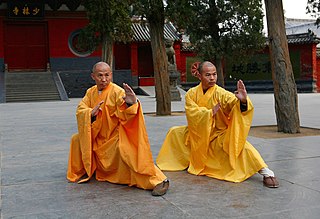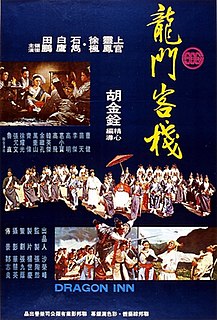
In general, kung fu/kungfu refers to the Chinese martial arts also called wushu and quanfa. In China, it refers to any study, learning, or practice that requires patience, energy, and time to complete. In its original meaning, kung fu can refer to any discipline or skill achieved through hard work and practice, not necessarily martial arts. The Chinese literal equivalent of "Chinese martial art" would be 中國武術 zhōngguó wǔshù.
Martial arts films are a genre of action films that feature numerous martial arts combat between characters. These combats are usually the films' primary appeal and entertainment value, and often are a method of storytelling and character expression and development. Martial arts are frequently featured in training scenes and other sequences in addition to fights. Martial arts films commonly include hand-to-hand combat along with other types of action, such as stuntwork, chases, and gunfights. Sub-genres of martial arts films include kung fu films, wuxia, karate films, and martial arts action-comedy films, while related genres include gun fu, jidaigeki and samurai films.

Wuxia, which literally means "martial heroes", is a genre of Chinese fiction concerning the adventures of martial artists in ancient China. Although wuxia is traditionally a form of fantasy literature, its popularity has caused it to spread to diverse art forms such as Chinese opera, mànhuà, films, television series and video games. It forms part of popular culture in many Chinese-speaking communities around the world.

The Three Gorges are three adjacent gorges along the middle reaches of the Yangtze River, in the hinterland of the People's Republic of China. With a subtropical monsoon climate, they are known for their scenery. The "Three Gorges Scenic Area" is classified as a AAAAA scenic area by the China National Tourism Administration.

Chongqing, alternately romanized as Chungking, is a municipality in southwest China.

Louis Cha Leung-yung, better known by his pen name Jin Yong, pronounced "Gum Yoong" in Cantonese, was a Chinese wuxia novelist and essayist who co-founded the Hong Kong daily newspaper Ming Pao in 1959 and served as its first editor-in-chief. He was Hong Kong's most famous writer, and is named along with Gu Long and Liang Yusheng as the "Three Legs of the Tripod of Wuxia".

Fong Sai-yuk was a Chinese martial artist and folk hero from Zhaoqing City, Guangdong Province of the Qing dynasty.

Chongqing Three Gorges University, established in 1956, is a national comprehensive university in Wanzhou District, Chongqing, at the heart of the Three Gorges areas on the Yangtze River. It presently has a total enrolment of 13,000 full-time domestic students and international students; and a staff of about 1,000, including about 300 professors and associate professors, about 400 Master's Degree or Doctor's Degree winners, and more than 60 external part-time Professors and international teachers. CTGU has 14 teaching faculties. It has more than 70 specialties for 3-year students and 4-year students, which cover eight disciplinary domains. It has prominent advantages in the teaching and research of the specialties of marketing, international trade, environmental protection, folk art, languages and literature, physical education, tourism, biology, chemical engineering, ethnonymics, and occupies the leading position in China in some of the specialties and subjects.
Chang Cheh was a Chinese filmmaker, screenwriter, lyricist and producer active in the 1960s, 1970s and 1980s. Chang Cheh directed more than 90 films in Greater China, the majority of them with the Shaw Brothers Studio in Hong Kong. Most of his films are action films, especially wuxia and kung fu films filled with violence.

Wushan County is a county located in Chongqing municipality. It occupies roughly 2,958 km2 (1,142 sq mi) and has a population of about 600,000.
Hong Kong action cinema is the principal source of the Hong Kong film industry's global fame. Action films from Hong Kong combined elements of Hollywood with Chinese and Hong Kong cultures such as Chinese opera, storytelling and aesthetic traditions, along with new action choreography and filmmaking techniques, to create a culturally distinctive form that went on to have wide transcultural appeal. In turn, Hollywood action films have been heavily influenced by Hong Kong genre conventions, from the 1970s onwards.

Dragon Inn is a 1967 Taiwanese wuxia film written and directed by King Hu. The film was remade in 1992, as New Dragon Gate Inn, and again in 2011 as The Flying Swords of Dragon Gate.
Kung fu film is a subgenre of martial arts films and Hong Kong action cinema set in the contemporary period and featuring realistic martial arts. It lacks the fantasy elements seen in wuxia, a related martial arts genre that uses historical settings based on ancient China. Swordplay is also less common in kung-fu films than in wuxia and fighting is done through unarmed combat.
The Shaolin Sect is a fictional martial arts sect mentioned in several works of wuxia fiction. It is one of the largest and best known orthodox sects in the wulin. Its base is in Shaolin Monastery, Henan, China. It is also sometimes referred to as "Shaolin Monastery" or "Shaolin Temple" instead of "Shaolin Sect".
Jianghu is the community of martial artists in wuxia stories and, more recently, outlaw societies like the Triads.

The Three Gorges Museum is a museum in the Yuzhong District of Chongqing, about the Three Gorges and Chongqing. It is one of the largest museums in the country.

The Baiheliang Underwater Museum or "White Crane Ridge Underwater Museum" is an underwater museum built around the White Crane Ridge of Fuling District, Chongqing. It is China's first underwater museum.
Xianxia is a genre of Chinese fantasy influenced by Chinese mythology, Taoism, Buddhism, Chinese martial arts, traditional Chinese medicine, Chinese folk religion and other traditional Chinese elements.
Li Shoumin, better known by his pen name Huanzhulouzhu, was a Szechwan-born Chinese wuxia and xianxia writer.








